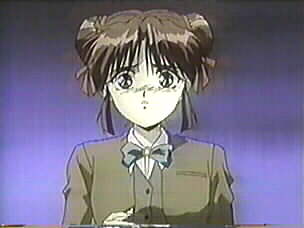|
||||||
Back | Anime titles | anime in romaji order | Shoujo | W.M.T | Old Anime | Manga titles | Blog Home
| Information | |
| Title (English) | Fushigi Yuugi |
| Title (Japanese) | Fushigi Yuugi | Advertising Fantasy Novel |

|
| Notes | (Alt. title = Mysterious Play) Genre(s): fantasy, dimensional travel, war, romance t |
| Classification | shoujo |
| Synopsis | This deservedly popular series is generally known by its Japanese title - in English it just means 'strange events'. One day two schoolgirls, Miaka and Yui, go into an archive room of the public library and open a strange old book. The book is magical - as they read, the events in the story start to take place and they are transported to an ancient Chinese world. The girls are separated. Miaka tries to track down her friend, and presently discovers that the people think that she (Miaka) is a reincarnation of Suzaku no Miko, a legendary protector of the country. During the series, Miaka makes several trips between the two worlds, returning home and then being drawn back by duty and love. |
| Review | This is a series well worth watching; it has a number of interesting characters; it's often very funny and Miaka makes a brave and very likeable heroine. When the other characters come to love her we can well understand why. Subtitles are essential. After the first eight or so episodes, the story takes a more serious turn, and while it remains in part a romantic comedy, some of what apparently happens to Yui and Miaka is not pleasant, not funny, and not about to be magicked away in a few minutes. At this point I had better point out that as animated TV series go, Fushigi Yuugi may disconcert some with its overt references to gayness and teenage sex. Not that its intended Japanese audience found it particularly shocking. There is considerable ambiguity in the script about how "innocent" Yui and Miaka are, and one is sometimes led to believe that they are not innocent at all, while in the second season the script casts doubt on this refreshingly realistic notion. At any rate, it's certain to shock those who still think that animation is purely for little children. The serious elements have the effect of raising the emotional intensity of the series to an extraordinary level. You may well find that you cannot get the characters out of your head all day, or that you are unable to stop the tape before the end of the volume. It achieves the rare trick in a fantasy comedy of making one feel that some matters are very real. Especially when it comes to intimate relationships, they're not joking. I have now watched all 52 episodes. The structure of the plot strongly suggests that it was drafted to be concluded with a successful calling of the Goddess around ep #26 if the series didn't continue for a second season. (though it seems the manga is essentially the same) It has to be said that the second season is a disappointment. It's not without it's moments; the sudden death of one of Miaka's guardians (it would be unfair to reveal who) is very moving and will bring tears to the eyes of many fans. On the other hand, there are many episodes where nothing happens except that Miaka's quest is held up by magical devices that some might think the scriptwriters probably made up as they went. One can also sense a toning down of the more 'adult' elements that were a refreshing feature of the first season. After about sixteen episodes of slow progress, the series suddenly becomes more interesting as Yui's side gains an advantage and the action switches location. The last nine episodes definitely have more pace and interest but even here the lengthily depicted action (three hours of it, note you) could be summarised quite briefly (but, to avoid 'spoilers', I won't). Neither Miaka nor Tamahome seem to learn any common sense in the course of 52 episodes, and the final episode's efforts to remedy this are too late to be convincing. One gets a bit tired of them running straight into danger and yelling "Miaka!!" "Tamahome!!" at moments of crisis. Particularly in the last few episodes, the deus ex machina character of the plot as the scriptwriters seem to fiddle with the rules for their own convenience is rather irritating. If you want to know more about this series, note that as it is popular, there should be WWW sites devoted to it. Try your favourite search engine. Surprisingly, it is almost impossible to find a complete set of synopses of the manga.The manga has now started to appear in English translation. If you get it, it's similarity to the anime script will be obvious. |
| Credits | Creator(s): Yu Watase; Character Designer(s): Hideyuki Motohashi Voice Actors (regular characters): Kae Araki (Miaka), Yumi Touma (Yui), Hikaru Midorikawa (Tamahome), Takehito Koyasu (Hototori), Chika Sakamoto (Nuriko), Tomokazu Seki (Chichiri), Hisako Kyouda (Taichi-kun), Yuuji Ueda (Saboshi), Nobutoshi Hayashi (Tasuki), Kouji Ishii (Mitsukake) |
| Episodes | 52 |
| Release | US:DVD, US:VHS |
| TV Showing | See the whole series for free? This series may be syndicated to regional cable, satellite or terrestial TV stations. For Europe click here. |
| Date | 1995 April 6 - 1996 March 28 |
| Production | Studio Pierrot |
| Broadcaster | |
| Animation | |
| References & Help | Look up the latest data on this title at: Richard Llewellyn's Animated Divots, or Anime News Network (see Encyclopedia section) , or in "The Anime Encyclopedia" (Clements & McCarthy, Stone Bridge Press, 2001). Help & further information. |
|


